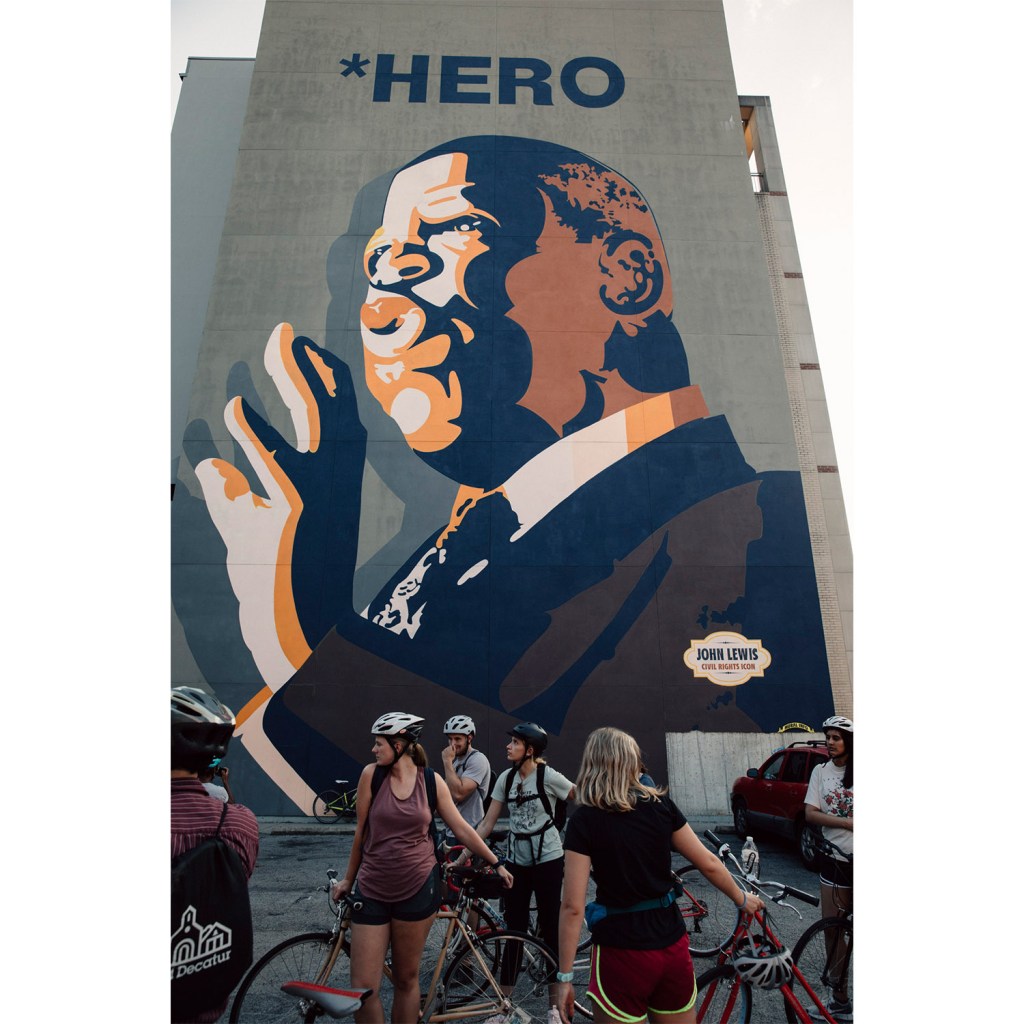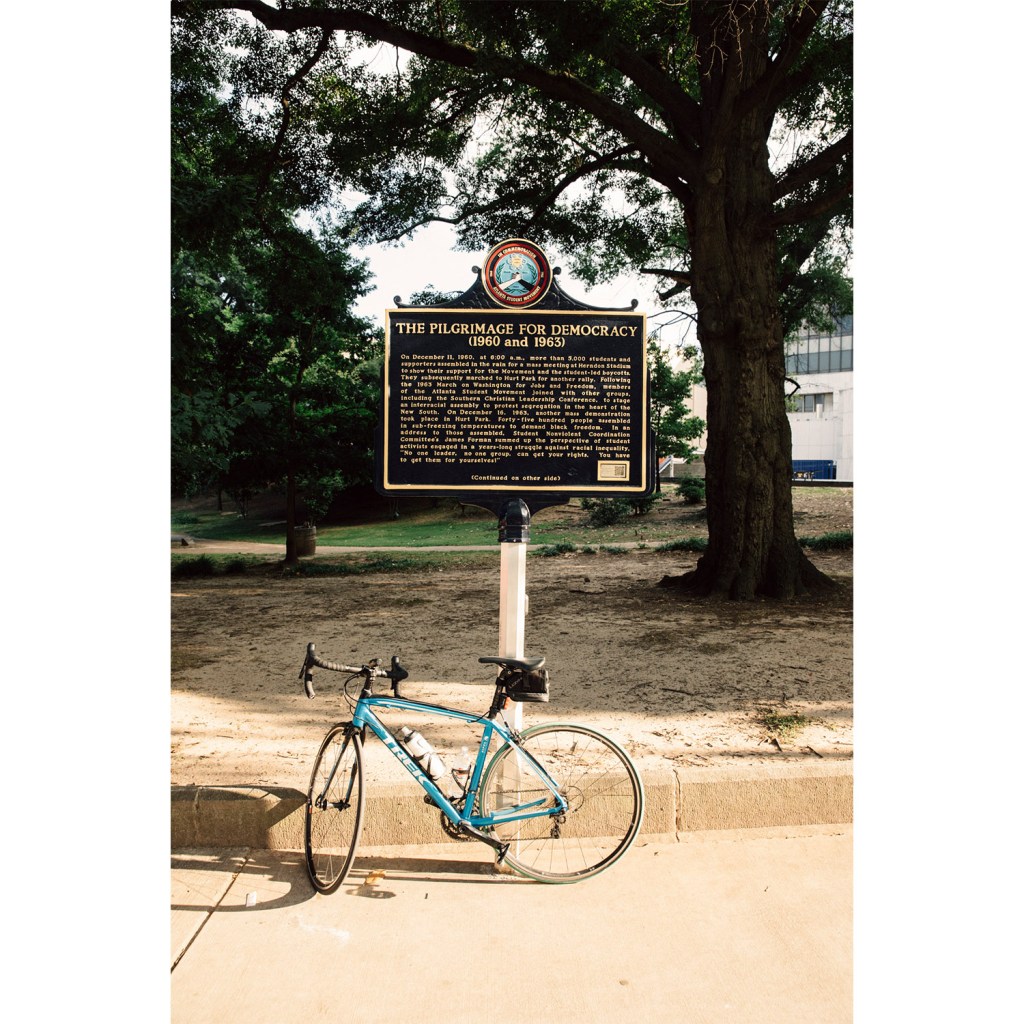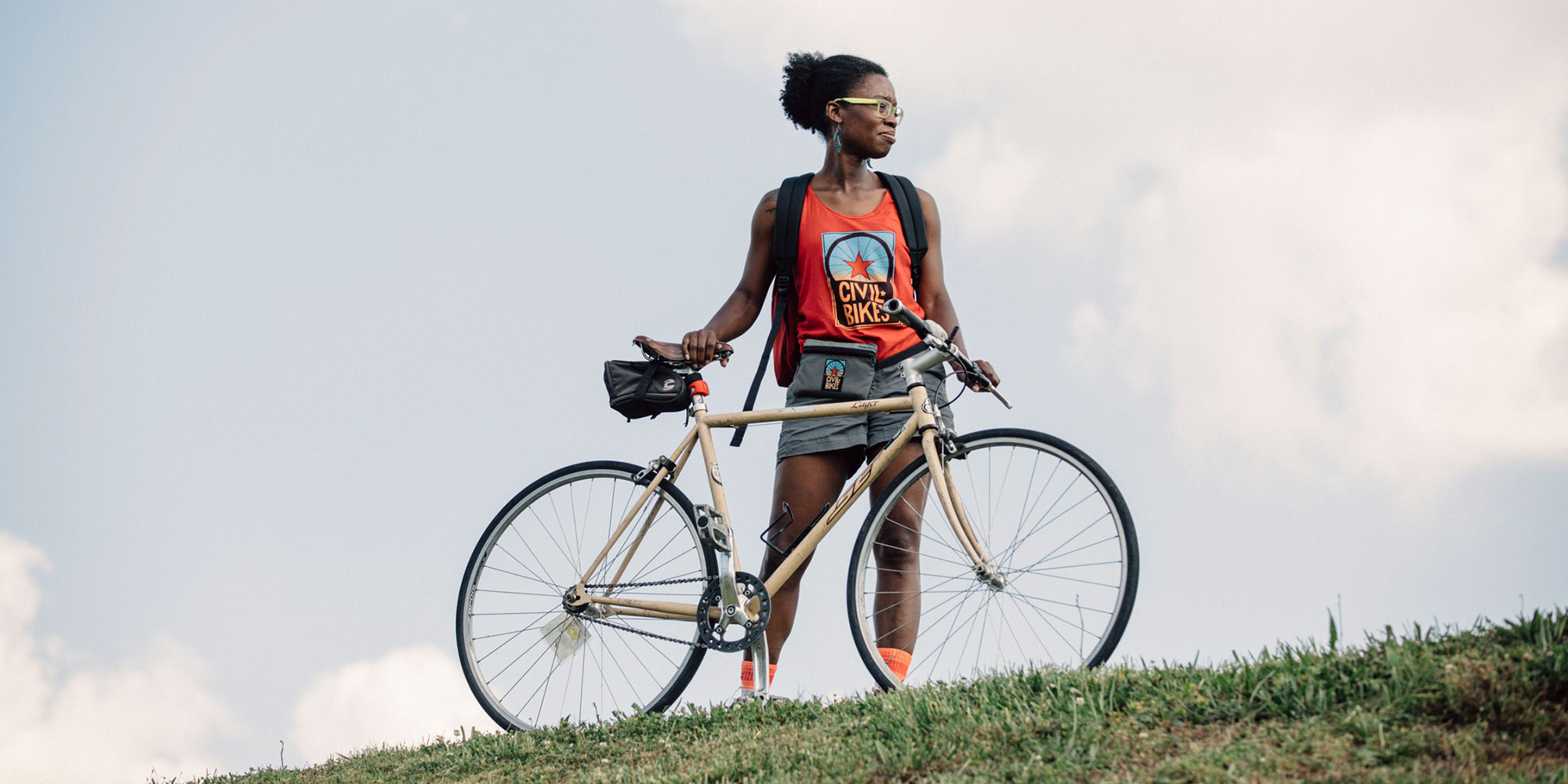A version of this story appeared in the fall 2019 issue of Uncommon Path.
Hidden under a magnolia tree at the Georgia State Capitol is a bronze statue depicting a complex chapter of the state’s history. It shows the 33 Black legislators who were elected to the General Assembly during Reconstruction only to be expelled by their white colleagues almost immediately after. It would be nearly a century before another Black lawmaker was admitted to the statehouse.
“You would miss that if you were in a car,” says Nedra Deadwyler, the youthful, 43-year-old founder of Atlanta’s Civil Bikes. “You can’t even see it from the sidewalk.”
The statue, located near monuments to white supremacists, including Ku Klux Klan leader John Brown Gordon, is just one of the stops on Deadwyler’s tour, a two-wheeled journey through the (in some cases, literally) hidden history of the civil rights movement in Atlanta. The route wends through a city where issues of social justice and racial equality are as real and present as the potholes on its streets. Deadwyler, with her gentle presence and easy smile, helps navigate the tricky terrain.
Deadwyler inaugurated Civil Bikes with a group ride on Martin Luther King Jr. Day in 2014. Now she and her team run public and private biking and walking tours that visit Atlanta’s first park for African Americans, opened at a time when the city’s main green space, Piedmont Park, was segregated; the Auburn Avenue corridor, home to Atlanta’s historically Black business district and the birthplace of King; and more.
A Georgia native, Deadwyler discovered her love of bicycling while living in New York City and earning a master’s degree in social work from New York University.
“It was either walking or biking where I felt like I actually connected to people, to the history,” she says. “You sense more, you connect more, the rhythm [of the city] becomes a part of you. If you’re in a car or on a bus, you’re so disconnected and in your own bubble, and your own thoughts override anything that could come at you from the environment.”

In Woodruff Park, where rallies protested the brutal inequalities of the justice system.
When Deadwyler came back to notoriously traffic-choked Atlanta, she wanted to find a way to keep riding while also connecting people to the lesser-known stories of the city’s past and present, channeling voices that had long since been silenced. That meant visiting monuments and historic sites and stops at businesses owned by Blacks, women, immigrants and people of color; she says 25% to 50% of the admission fee is spent in the communities visited.
“It’s about the preservation of spaces and also of culture,” Deadwyler says, noting that many longtime residents of these neighborhoods face displacement from rising rents, a consequence of the city’s rapid gentrification. “We’ve got to build a relationship between the existing community and the new community, otherwise they’ll never come together.”
Deadwyler’s background in social work helps her mediate conversations about delicate topics that arise on the tours, which can inspire intense emotions. On one tour in 2014, a college-age kid brought his 50-year-old parents, who had raised their son with an awareness of the civil rights movement. Deadwyler’s narration proved to be a “full-circle moment” for the mother. At one point, she had to pull over because she’d started to cry. “It was so heart-wrenching—and also a beautiful moment for all of us,” Deadwyler says. “It’s one that has stuck with me.”

Riders rest in the shadow of giants—in this case, civil rights icon Rep. John Lewis.
But the most common reaction to the tours? Discomfort.
“Most people are uncomfortable with the discussion around race,” Deadwyler says, adding that even using seemingly benign descriptors like “Black people” and “white people” can make some uneasy. “Sometimes it’s about interacting with someone’s silence. We’re trying to invite people to interact with space and place and history, [and that requires] a willingness to be vulnerable in ways we’re not always comfortable.”
Often cultural and racial gaps show—and in those moments, in those differences, something can be learned. One insight: Deadwyler says non-Black participants are more likely to look for a positive takeaway, whereas Black riders can better handle stories of suffering and injustice. And surprises abound. She recalls leading a tour with middle schoolers from mostly white Telluride, Colorado; their teacher said the students had questions but were afraid they might offend. Deadwyler invited them to speak up, and the result was profound. “They asked a lot of good questions about me personally and how to help someone who’s new to their town feel like they belong,” she says. “We talked about belonging, and for seventh- and eighth-graders, that is really deep. Most of us desire to belong no matter where we are.”

Historic plaques, often missed, tell the story of the civil rights struggle where it happened.
Deadwyler hopes those who bike with her come away from the experience with a more complete picture of her home city.
“There’s a version of Atlanta that we hear about: You know, the Real Housewives, Coca-Cola, King,” she says. “But I hope that when visitors go on a tour, they leave it knowing there’s much more to Atlanta. I hope they see some of the grit and some of the dirt and some of the shine too.”
Seeing More Than Sights
Pedal to Porch, Detroit
Detroit Community organizer Cornetta Lane founded this ride to strengthen the social fabric of Detroit’s neighborhoods. Participants pedal between predetermined stops, where residents use their front porch as a stage to tell their story. Visit Lane’s website to learn how to start your own. pedaltoporch.org
Bike and Brunch Tours, Baltimore
These casual 5-mile tours through Charm City’s historically Black communities end with a group brunch. But in addition to good food, the focus is on what organizers call “the soul of the city,” a place that is an incubator for intellectual and artistic genius. “We plan fun, informative and eye-opening rides that may cross some harsh realities but serve as a beacon to the culture, history and virtue that lie at the city’s core.” bikeandbrunchtours.com
BiciBrujxs, El Paso, Texas, and Ciudad Juárez, Mexico
This cross-border bike group has hosted rides and other social events to protest violence against women and to support queer, femme, trans, gender-nonconforming and nonbinary communities. facebook.com/bicibrujxs
WTF Bikexplorers, International
WTF (Women, Transgender, Femme) Bikexplorers aims to foster connection, gender inclusivity and racial equality through its annual summit and multiday adventure rides on the roads of Vermont, the Gulf Islands of British Columbia and other settings. wtfbikexplorers.com
Photography by Wes Frazer
